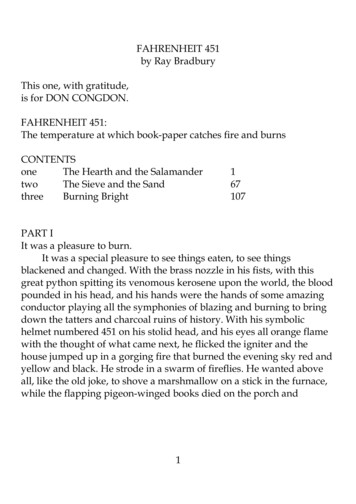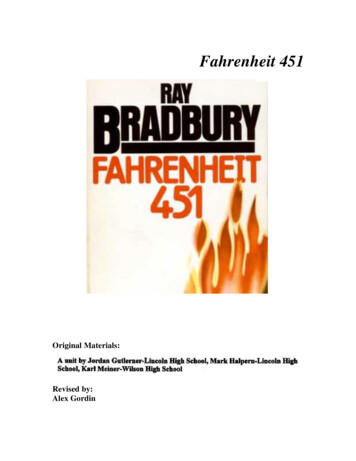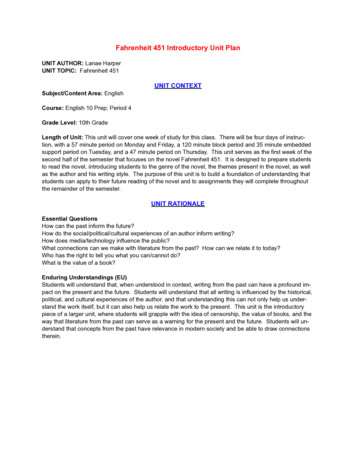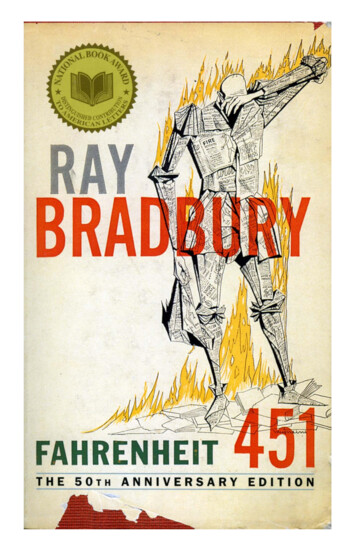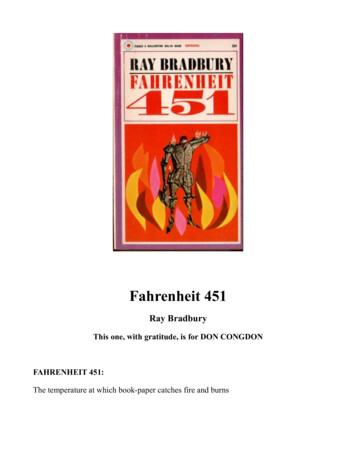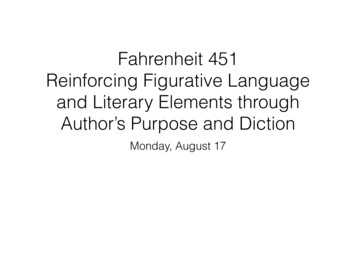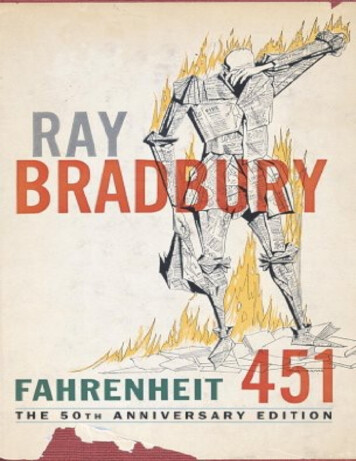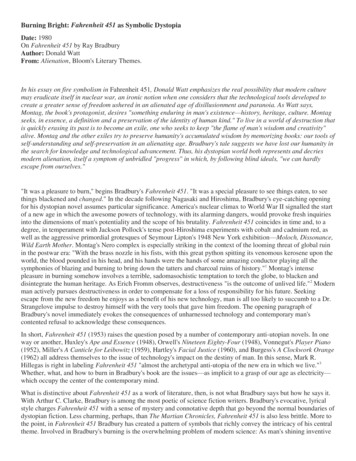
Transcription
Burning Bright: Fahrenheit 451 as Symbolic DystopiaDate: 1980On Fahrenheit 451 by Ray BradburyAuthor: Donald WattFrom: Alienation, Bloom's Literary Themes.In his essay on fire symbolism in Fahrenheit 451, Donald Watt emphasizes the real possibility that modern culturemay eradicate itself in nuclear war, an ironic notion when one considers that the technological tools developed tocreate a greater sense of freedom ushered in an alienated age of disillusionment and paranoia. As Watt says,Montag, the book's protagonist, desires "something enduring in man's existence—history, heritage, culture. Montagseeks, in essence, a definition and a preservation of the identity of human kind." To live in a world of destruction thatis quickly erasing its past is to become an exile, one who seeks to keep "the flame of man's wisdom and creativity"alive. Montag and the other exiles try to preserve humanity's accumulated wisdom by memorizing books: our tools ofself-understanding and self-preservation in an alienating age. Bradbury's tale suggests we have lost our humanity inthe search for knowledge and technological advancement. Thus, his dystopian world both represents and decriesmodern alienation, itself a symptom of unbridled "progress" in which, by following blind ideals, "we can hardlyescape from ourselves.""It was a pleasure to burn," begins Bradbury's Fahrenheit 451. "It was a special pleasure to see things eaten, to seethings blackened and changed." In the decade following Nagasaki and Hiroshima, Bradbury's eye-catching openingfor his dystopian novel assumes particular significance. America's nuclear climax to World War II signalled the startof a new age in which the awesome powers of technology, with its alarming dangers, would provoke fresh inquiriesinto the dimensions of man's potentiality and the scope of his brutality. Fahrenheit 451 coincides in time and, to adegree, in temperament with Jackson Pollock's tense post-Hiroshima experiments with cobalt and cadmium red, aswell as the aggressive primordial grotesques of Seymour Lipton's 1948 New York exhibition—Moloch, Dissonance,Wild Earth Mother. Montag's Nero complex is especially striking in the context of the looming threat of global ruinin the postwar era: "With the brass nozzle in his fists, with this great python spitting its venomous kerosene upon theworld, the blood pounded in his head, and his hands were the hands of some amazing conductor playing all thesymphonies of blazing and burning to bring down the tatters and charcoal ruins of history."1 Montag's intensepleasure in burning somehow involves a terrible, sadomasochistic temptation to torch the globe, to blacken anddisintegrate the human heritage. As Erich Fromm observes, destructiveness "is the outcome of unlived life."2 Modernman actively pursues destructiveness in order to compensate for a loss of responsibility for his future. Seekingescape from the new freedom he enjoys as a benefit of his new technology, man is all too likely to succumb to a Dr.Strangelove impulse to destroy himself with the very tools that gave him freedom. The opening paragraph ofBradbury's novel immediately evokes the consequences of unharnessed technology and contemporary man'scontented refusal to acknowledge these consequences.In short, Fahrenheit 451 (1953) raises the question posed by a number of contemporary anti-utopian novels. In oneway or another, Huxley's Ape and Essence (1948), Orwell's Nineteen Eighty-Four (1948), Vonnegut's Player Piano(1952), Miller's A Canticle for Leibowitz (1959), Hartley's Facial Justice (1960), and Burgess's A Clockwork Orange(1962) all address themselves to the issue of technology's impact on the destiny of man. In this sense, Mark R.Hillegas is right in labeling Fahrenheit 451 "almost the archetypal anti-utopia of the new era in which we live."3Whether, what, and how to burn in Bradbury's book are the issues—as implicit to a grasp of our age as electricity—which occupy the center of the contemporary mind.What is distinctive about Fahrenheit 451 as a work of literature, then, is not what Bradbury says but how he says it.With Arthur C. Clarke, Bradbury is among the most poetic of science fiction writers. Bradbury's evocative, lyricalstyle charges Fahrenheit 451 with a sense of mystery and connotative depth that go beyond the normal boundaries ofdystopian fiction. Less charming, perhaps, than The Martian Chronicles, Fahrenheit 451 is also less brittle. More tothe point, in Fahrenheit 451 Bradbury has created a pattern of symbols that richly convey the intricacy of his centraltheme. Involved in Bradbury's burning is the overwhelming problem of modern science: As man's shining inventive
intellect sheds more and more light on the truths of the universe, the increased knowledge he thereby acquires, ifabused, can ever more easily fry his planet to a cinder. Burning as constructive energy, and burning as apocalypticcatastrophe, are the symbolic poles of Bradbury's novel. Ultimately, the book probes in symbolic terms the puzzling,divisive nature of man as a creative/destructive creature. Fahrenheit 451 thus becomes a book which injectsoriginality into a literary subgenre that can grow worn and hackneyed. It is the only major symbolic dystopia of ourtime.The plot of Fahrenheit 451 is simple enough. In Bradbury's future, Guy Montag is a fireman whose job it is to burnbooks and, accordingly, discourage the citizenry from thinking about anything except four-wall television. He meetsa young woman whose curiosity and love of natural life stir dissatisfaction with his role in society. He begins to readbooks and to rebel against the facade of diversions used to seal the masses away from the realities of personalinsecurity, officially condoned violence, and periodic nuclear war. He turns against the authorities in a rash andunpremeditated act of murder, flees their lethal hunting party, and escapes to the country. At the end of the book hejoins a group of self-exiled book-lovers who hope to preserve the great works of the world despite the opposition ofthe masses and a nuclear war against an unspecified enemy.In such bare detail, the novel seems unexciting, even a trifle inane. But Bradbury gives his story impact andimaginative focus by means of symbolic fire. Appropriately, fire is Montag's world, his reality. Bradbury's narrativeportrays events as Montag sees them, and it is natural to Montag's way of seeing to regard his experiences in terms offire. This is a happy and fruitful arrangement by Bradbury, for he is thereby able to fuse character development,setting, and theme into a whole. Bradbury's symbolic fire gives unity, as well as stimulating depth, to Fahrenheit451.[ ]Bradbury continues to play variations on burning in the final sequence of Part Two, where the two different, indeedopposite, kinds of flame flicker out at each other. Montag's return to the firehouse provokes Beatty to welcome him:"I hope you'll be staying with us, now that your fever is done and your sickness over" (p. 94). For Beatty, Montag'sinner burning is the result of a fever. From Beatty's point of view, this burning means that a man has been unwell.But Montag wishes to nourish the burning; he doesn't want to return to normal. Beatty, however, enervates Montagwith his "alcohol-flame stare" (p. 95) and a confusing barrage of conflicting quotations. Montag feels he cannot goon burning with the firemen, yet he is as powerless to answer Beatty's onslaught as he would be to stop theSalamander, the fire engine, that "gaseous dragon roaring to life" (p. 98). Montag is chagrined by the recollection ofreading a book to "the chaff women in his parlor tonight" and realizes it was as senseless as "trying to put out fireswith waterpistols" (p. 99). In his typically figurative way, Bradbury is telling us that Montag's psychic temperaturecannot remotely approach the 451 degrees Fahrenheit which is the minimal level of power enjoyed by the firemen.On appearance, at any rate, and for the moment, Montag's rage for individual responsibility is puny by comparisonwith the firepower of Beatty's crew.The ramifications of Bradbury's two fires become clearer in Part Three, "Burning Bright," for the sequence of eventsportrays Montag's movement from one to the other, from the gorging arson of his own house to the comfortingcampfire of Granger. In this section Montag's growth develops into a belief in what Blake symbolizes in his poem,"The Tiger":Tiger! Tiger! burning brightIn the forests of the night,What immortal hand or eyeCould frame thy fearful symmetry?Blake's tiger is the generative force of the human imagination, the creative/destructive force which for him is theheart of man's complex nature. Montag becomes Bradbury's tiger in the forests of the night. He becomes a huntedoutcast from an overly tame society by making good his violent escape from the restraining cage of the city. In hisrebellion and flight, Montag is burning bright. Paradoxically, the flame of his suppressed human spirit spreadsthrough his whole being after his horrible murder of Beatty. In burning Beatty, Montag shares the ambivalence ofBlake's tiger, with its symbolic combination of wrath and beauty, its "fearful symmetry."Bradbury introduces another allusion, one connected with his major symbol, when the fire engine pulls up beforeMontag's house at the opening of the third section and Beatty chides him: "Old Montag wanted to fly near the sun
and now that he's burnt his wings, he wonders why" (p. 100). Beatty's reference is to the mythological Icarus whosoared into the sky with Dedalus, his father, on wax wings. But Icarus, carried away by the joy of flying, went tooclose to the sun, causing his wings to melt and making him fall. Clarisse, we recall, used to stay up nights waiting forthe sunrise, and her face reminded Montag of a clock dial pointing toward a new sun. The sun, traditional symbol oftruth and enlightenment, is antithetical to the dark night of ignorance that Beatty spreads across the land. Thedifference between Montag and Icarus—which, of course, Beatty will never live to see—is that Montag, thoughcrippled by the Mechanical Hound, survives his own daring. Burning bright and living dangerously, Montag skirtsthe destruction Beatty plans for him and flees to the liberated periphery of society where pockets of truth endureundimmed.At the beginning of Part Three, however, Beatty prevails. Montag once more enjoys the purging power of thefireman as he lays waste to his own house: "And as before, it was good to burn, he felt himself gush out in the fire,snatch, rend, rip in half with flame, and put away the senseless problem . Fire was best for everything!" Montagdestroys his house piecemeal, surprised that his twin beds go up "with more heat and passion and light than he wouldhave supposed them to contain." Bradbury's lyrical style conveys Montag's fascination with the splendor and thetransforming power of the flames. His books "leapt and danced like roasted birds, their wings ablaze with red andyellow feathers." He gives the TV parlor "a gift of one huge bright yellow flower of burning" (p. 103). Beatty affectsMontag strongly with his enticing argument for burning:What is fire? It's a mystery. Scientists give us gobbledegook about friction and molecules. But they don't reallyknow. Its real beauty is that it destroys responsibility and consequences. A problem gets too burdensome, then intothe furnace with it. Now, Montag, you're a burden. And fire will lift you off my shoulders, clean, quick, sure;nothing to rot later. Anti-biotic, aesthetic, practical. (p. 102)With a happy vengeance Montag levels the house where he has become a stranger to his own wife. He feels asthough a fiery earthquake is razing his old life as Montag the fireman, burying his artificial societal self, while in hismind his other self is running, "leaving this dead soot-covered body to sway in front of another raving fool" (p. 104).Beatty cannot understand that at this point Montag is inwardly turning the flamethrower against its owners, that byburning his house he is deliberately destroying his niche in Beatty's system.Only when Beatty threatens to trace Faber does Montag realize that the logical end to his action must be the torchingof his chief. As Montag recognizes, the problem is, "we never burned right " (p. 105). The shrieking, melting,sizzling body of Beatty is Bradbury's horrible emblem of the end result of a civilization based on irresponsibility.Beatty has always told Montag not to face a problem, but to burn it. Montag considers: "Well, now I've done both"(p. 107). One may conclude that Montag fights fire with fire.The remainder of the novel consists of Montag's escape from the domain of the Mechanical Hound, his immersion inthe countryside, and his discovery of Granger's group of bookish outcasts. Montag is still very much in Beatty'sworld as he flees through the city. Stung by the Mechanical Hound, his leg is "like a chunk of burnt pinelog he wascarrying along as a penance for some obscure sin" (p. 107). As he runs his lungs feel "like burning brooms in hischest" (p. 112), his throat like "burnt rust" (p. 123). In his narrow escape from a police car, the lights from thehighway lamps seem "as bright and revealing as the midday sun and just as hot" (p. 112), and the car bearing downon him is "a torch hurtling upon him" (p. 113). Montag wants to get out of the distressing heat of Beatty's city andinto the cool seclusion of the country. Bradbury stresses that the real insanity of the firemen's world is the pleasurepeople take in random violence and destruction. Accordingly, just before he sets off to elude the Mechanical Hound,Montag tells Faber that in his death scene he would like to say just one or two words "that would sear all their facesand wake them up" (p. 120). He deeply regrets what he did to Beatty, transformed now into "nothing but a frameskeleton strung with asphalt tendons," but he feels he must remember, "burn them or they'll burn you . Right nowit's as simple as that" (p. 109). It is perhaps instructive to note that one of Montag's last acts in the city is to frame thefireman named Black.Bradbury broadens Montag's perspective on burning when Montag wades into a river and floats downstream awayfrom the harsh glare of the pursuing searchlights. The life-saving river, a symbol of life's journey and its baptismalvitality, carries Montag into the world of nature: "For the first time in a dozen years the stars were coming out abovehim, in great processions of wheeling fire. He saw a great juggernaut of stars form in the sky and threaten to roll overand crush him" (p. 124). The great fires of the cosmos have been concealed from Montag by the glittering arcs of the
city. Immersed in the river and free of the electric jitters of city life, Montag at last discovers leisure to think forhimself. Beatty had said that one of fire's attractions for man is its semblance of perpetual motion. Montag, reflectingon the moon's light, becomes aware that the sun burns every day, burns time, burns away the years and people'slives. Before long, he knows "why he must never burn again in his life." He sees that "if he burnt things with thefiremen and the sun burnt Time, that meant that everything burned!" But he feels that somehow conserving mustbalance consuming:One of them had to stop burning. The sun wouldn't, certainly. So it looked as if it had to be Montag and the peoplehe had worked with until a few short hours ago. Somewhere the saving and putting away had to begin again andsomeone had to do the saving and keeping, one way or another, in books, in records, in people's heads, any way at allso long as it was safe, free from moths, silver-fish, rust and dry-rot, and men with matches. The world was full ofburning of all types and sizes. Now the guild of the asbestos-weaver must open shop very soon. (p. 125).This key passage illuminates Montag's sensed need for some form of permanence to counteract the instability ofdestruction and change. Man should not capitulate to the tyranny of the nitrogen cycle, to the mutabilitycharacteristic of the physical, dynamic world. Montag's emerging desire is for something enduring in man'sexistence—history, heritage, culture. Montag seeks, in essence, a definition and a preservation of the identity ofhuman kind.Montag's recognition of another mode of burning, therefore, is at this stage eminently appropriate to Bradbury'stheme. Enchanted by the warmth of the country, which is implicitly contrasted with the coldness of Mildred'sbedroom, reminded of Clarisse by all the natural smells of the vegetation surrounding him—"a dry river smelling ofhot cloves," "a smell like a cut potato from all the land," "a faint yellow odor like parsley on the table at home," "asmell like carnations from the yard [Clarisse's] next door" (p. 128)—Montag comes upon a campfire which strikeshim as strange "because it meant a different thing to him" (p. 129). The difference is, he abruptly notices: "It was notburning, it was warming." Men hold their hands toward this warmth; they do not recoil in terror from it. Montag"hadn't known fire could look this way. He had never thought in his life that it could give as well as take. Even itssmell was different." Montag feels like some forest creature "of fur and muzzle and hoof" attracted to the fire and"listening to the warm crackle of the flames." No longer a fierce tiger because he has escaped the mad jungle ofBeatty's city, Montag is now like a shy, wondering animal of the woods. Free of the ceaseless noise of "the family,"Montag feels the silence as well as the flame of the camp is different. The men around the fire have time to "look atthe world and turn it over with the eyes, as if it were held to the center of the bonfire, a piece of steel these men wereall shaping" (p. 130). Bradbury's figure is of utmost importance, since it recalls Faber's comment that all ofcivilization must be melted down and reshaped. Involved in Montag's sighting of Granger's group is the hope that thenew kind of burning may bring about some possibility of a new kind of world.The purpose of their group, Granger explains, is to preserve man's cultural heritage through the current dark age ofhis history. They are keepers of the flame of man's wisdom and creativity. They live in the forests of the night,harboring their gentle light against the annihilating torches of the city's firemen. But Montag, expecting "their facesto burn and glitter with the knowledge they carried, to glow as lanterns glow, with the light in them," is disappointed.There is no inner glow to their faces, only resignation. These men are now waiting for "the end of the party and theblowing out of the lamps." They know that nuclear war is imminent, that the joyride of Beatty's society is over, thatthe future of man is unsure: "They weren't at all certain that the things they carried in their heads might make everyfuture dawn glow with a purer light " (p. 138). Shortly, the bombs turn the city into what Granger describes as "aheap of baking powder" (p. 145), with Mildred and the others now literally buried under the volcano in which theyhave burned away their existences. The contrast between fire as holocaust and fire as hearth becomes pointed asGranger's men settle around a campfire to cook bacon. Fire, like technology and knowledge, is good or bad,depending on how one uses it.At the close, Granger compares man with the Phoenix, the mythical bird that lives for hundreds of years in thedesert, consumes itself in fire, and then rises reborn from its own ashes. It appears to Granger that man periodicallydoes the same thing, with the difference that man knows what he is doing to himself: "We know all the damn sillythings we've done for a thousand years and as long as we know that and always have it around where we can see it,some day we'll stop making the goddam funeral pyres and jumping in the middle of them." Granger hopes that, withmore people each generation seeing man's record of folly, some day they will "remember so much that we'll buildthe biggest steamshovel in history and dig the biggest grave of all time and shove war in and cover it up" (p. 146).
Bradbury's mood at best is one of modified optimism, at worst, skeptical ambivalence. The question he raises butleaves unexplored is whether man can ever transcend the cycles of construction and devastation that havecharacterized his history. Granger's hope notwithstanding, one must remember the phoenix-disc is also one of thefiremen's symbols.Yet at the very end, Bradbury does inject the promise of at least a seasonal renewal, and perhaps more, for man. Asthe men put out their campfire, "the day was brightening all about them as if a pink lamp had been given more wick"(pp. 146-47). The candle figure is instructive, for it brings the reader all the way back to Clarisse and the kind,humane light she stands for. As they break camp the men, including Granger, fall in behind Montag, suggesting thathe will become their leader. Montag, which means Monday in German, will conceivably light their way to a freshbeginning for man. As he wonders what he can say to make their trip upriver a little easier, Montag feels in hismemory "the slow simmer" of words from the Bible. At first he remembers the initial verses from Chapter 3 ofEcclesiastes: "To everything there is a season. Yes. A time to break down, and a time to build up. Yes. A time tokeep silence and a time to speak. Yes, all that." But The Preacher's words on the vanity of worldly things are notenough for Montag. He tries to remember something else. He digs into his memory for the passage from Revelations22:2: "And on either side of the river was there a tree of life, which bare twelve manner of fruits, and yielded herfruit every month; And the leaves of the tree were for the healing of the nations" (p. 147). This is the thought Montagwants to reserve for noon, the high point of the day, when they reach the city. Bradbury draws on the Biblical notionof a heavenly Jerusalem, the holy city where men will dwell with God after the apocalypse. Its appeal for Montag isthe final stroke of Bradbury's symbolism. In the Bible the heavenly city needs no sun or moon to shine on it, forGod's glory is what keeps it lit. The nations of the Earth will walk together by this light, and there will be no nightthere. The light Montag bears in Granger's remnant of humanity is the Biblical hope for peace and immutability formankind. This light is the permanent flame Montag has discovered in answer to the devouring nuclear burninginvited by Beatty's society and as a counterpoint to the restless Heraclitean fire of the visible cosmos.From its opening portrait of Montag as a singed salamander, to its concluding allusion to the Bible's promise ofundying light for man, Fahrenheit 451 uses a rich body of symbols emanating from fire to shed a variety ofilluminations on future and contemporary man.4To be sure, the novel has its vulnerable spots. For one thing, Montag's opposition is not very formidable. Beatty is anarticulate spokesman for the authorities, but he has little of the power to invoke terror that Orwell's O'Brien has. TheMechanical Hound is a striking and sinister gadget; but for all its silent stalking, it conveys considerably less realalarm than a pack of aroused bloodhounds. What is genuinely frightening is the specter of that witless mass ofhumanity in the background who feed on manhunts televised live and a gamey version of highway hit-and-run. Foranother thing, the reader may be unsettled by the vagueness with which Bradbury defines the conditions leading tothe nuclear war. Admittedly, his point is that such a lemming-like society, by its very irresponsibility, will ultimatelyend in destruction. But the reader is justifiably irritated by the absence of any account of the country's politicalsituation or of the international power structure. The firemen are merely enforcers of noninvolvement, not nationalpolicy-makers. The reader would like to know something more about the actual controllers of Beatty's occupation.Who, we wonder, is guarding the guardians?Probably a greater problem than either of these is what some readers may view as a certain evasiveness onBradbury's part. Presumably, the controversies and conflicts brought on by reading books have led to the system ofmass ignorance promulgated by Beatty. Even with this system, though, man drifts into nuclear ruin. Bradburyglosses over the grim question raised by other dystopian novelists of his age: If man's individuality and knowledgebring him repeatedly to catastrophe, should not the one be circumscribed and the other forbidden? Such novels as ACanticle for Leibowitz, A Clockwork Orange, and Facial Justice deal more realistically with this problem than doesFahrenheit 451. Although the religious light shining through Montag from the Bible is a fitting climax to the book'suse of symbolism, Bradbury's novel does risk lapsing at the very close into a vague optimism.Yet Fahrenheit 451 remains a notable achievement in postwar dystopian fiction. Surely it deserves more than itsrecent dismissal by a noted science fiction critic as "an incoherent polemic against book-burning."5 The book'sweaknesses derive in part from that very symbolism in which its strength and originality are to be found. IfFahrenheit 451 is vague in political detail, it is accordingly less topical and therefore more broadly applicable to thedilemmas of the twentieth century as a whole. Like the nineteenth-century French symbolists, Bradbury's purpose isto evoke a mood, not to name particulars. His connotative language is far more subtle, his novel far more of one
piece, than Huxley's rambling nightmare, Ape and Essence. Though the novel lacks the great impact of NineteenEighty-Four, Kingsley Amis is right when he says that Farenheit 451 is "superior in conciseness and objectivity" toOrwell's anti-utopian novel.6 If Fahrenheit 451 poses no genuinely satisfying answers to the plight of postindustrialman, neither is the flight to the stars at the end of A Canticle for Leibowitz much of a solution. We can hardly escapefrom ourselves. By comparison with Bradbury's novel, Facial Justice is tepid and A Clockwork Orange overdone.On the whole, Farenheit 451 comes out as a distinctive contribution to the speculative literature of our times,because in its multiple variations on its fundamental symbol, it demonstrates that dystopian fiction need not excludethe subtlety of poetry.Notes1. Ray Bradbury, Fahrenheit 451, New York: Ballantine Books, 1967, p. 3. Subsequent page references inthe text are to this edition of the novel.2. Erich Fromm, Escape from Freedom, New York: Avon Books, 1966; orig. publ. 1941, p. 207.3. Mark R. Hillegas, The Future as Nightmare: H.G. Wells and the Anti-Utopians, New York: Oxford UP,1967, p.158.4. Clearly there are many additional examples one could cite of Bradbury's uses of fire and its associatedfigures. An open book falls into Montag's hands at 11 North Elm and the words on the page "blazed inhis mind for the next minute as if stamped there with fiery steel" (p. 34). In his initial talk with Montag,"Beatty knocked his pipe into the palm of his pink hand, studied the ashes as if they were a symbol tobe diagnosed and searched for meaning" (p. 54). The Mechanical Hound comes sniffing at Montag'sdoor, bringing "the smell of blue electricity" (p. 64). Mildred argues with Montag that the books willget them into trouble: "She was beginning to shriek now, sitting there like a wax doll melting in its ownheat" (p. 68). Montag links his stumbling into Mildred's empty pillbox in the dark with "kicking aburied mine" (p. 69). When Montag first visits his house, Faber asks: "What knocked the torch out ofyour hands?" (p. 73). In rebuking Montag for falling under the influence of Clarisse, Beatty tells himsuch do-gooders "rise like the midnight sun to sweat you in your bed" (p. 101). As Montag prepares tocross the highway during his escape, he thinks it incredible "how he felt his temperature could cause thewhole immediate world to vibrate" (p. 111).5. David N. Samuelson, "Limbo: The Great American Dystopia," Extrapolation, 19 (Dec. 1977), pp. 77–78.6. Kingsley Amis, New Maps of Hell, New York: Harcourt, Brace, 1960, p. 109.Citation InformationWatt, Donald. "Burning Bright: Fahrenheit 451 as Symbolic Dystopia." Ray Bradbury, edited by Joseph Olanderand M.H. Greeberg, 195–213. New York: Taplinger, 1980. Quoted as "Burning Bright: Fahrenheit 451 as SymbolicDystopia" in Bloom, Harold, ed. Alienation, Bloom's Literary Themes. New York: Chelsea House, 2009. Bloom'sLiterature. Facts On File, Inc. Web. 28 Aug. 2015. http://www.fofweb.com/activelink2.asp?ItemID WE54&SID 5&iPin BLTA009&SingleRecord True .
What is distinctive about Fahrenheit 451 as a work of literature, then, is not what Bradbury says but how he says it. With Arthur C. Clarke, Bradbury is among the most poetic of science fiction writers. Bradbury's evocative, lyrical style charges Fahrenheit 451 with a sense of mystery and connotative depth that go beyond the normal boundaries of
